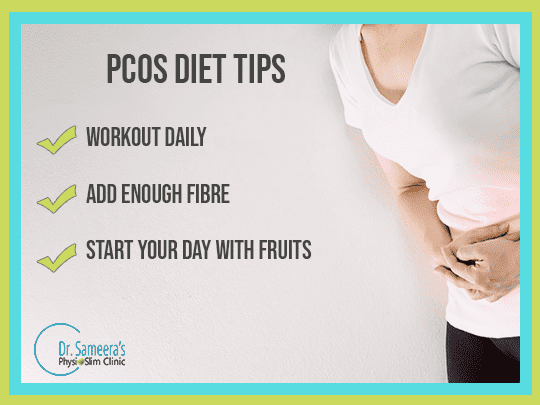Are you in search of that one blog that can exactly explain to you what is PCOS? Are you struggling with a heavy flow of period or no period? Do you hate acne and you are tired of doing home remedies? This blog will tell you the causes of PCOS and some solution for it. Let’s understand exactly what is going on inside your body and how to correct it.
Struggling with PCOS? Let's find a personalized solution
Book AppointmentWhat is PCOS?
Do you know what is PCOS? Full form of PCOS is polycystic ovary syndrome. It is a hormonal disorder in women. In the word “polycystic”, Poly means ‘many’ and cystic for ‘cyst’. Cysts are small sacs that are filled with fluids. These grow inside the ovary. These fluid filled sacs are actually follicles, containing immature eggs. These eggs will never mature enough to promote ovulation.
The lack of ovulation causes a lot of hormonal imbalance. As a result, women with PCOS produce higher amounts of androgen (male hormone). This extra male hormone disturbs the menstrual cycle, so women with PCOS have irregular periods.
It is not a new condition or disease. About 26-27℅ of women in the world have PCOS.
What are the causes of PCOS
There is no exact cause of PCOS. They believe that higher levels of androgen prevent ovaries from producing hormones and making eggs normally.
Genes, insulin resistance, and inflammation are linked to excess male hormone production. So, before knowing about the PCOS diet plan you should know some of the causes of it.
-
Genes
studies show that PCOS is a genetic disorder which transfers from parent to offspring. It's likely that not just one gene but a number of genes are responsible for PCOS
-
Insulin resistance-
Around, 70 ℅ of women with PCOS have insulin resistance, meaning that their cells are unable to use insulin properly. Insulin is a hormone that the pancreas produces to use sugar from foods for energy. When cells can’t use insulin hormone properly, the body’s demand for insulin increases. The pancreas makes more amount of insulin to compensate. Raise in the level of insulin triggers the ovaries to produce more male hormones.
-
Inflammation
Women with PCOS may have higher levels of inflammation in their body. Weight gain can also contribute to inflammation. Studies have linked the cause of excess inflammation to higher androgen levels.
-
Obesity
Obesity may play a pathogenetic role in the development of the syndrome in susceptible individuals.
-
Excess Male Harmone
Overproduction of male hormones by the ovaries leads to irregular periods and impaired fertility.
What are the most common PCOS symptoms
-
Irregular periods
Lack of ovulation can prevent the uterus lining from shedding every month. Some women with PCOS get less than 8 periods a year or none at all.
-
Heavy bleeding
The uterine lining(layer) continuously builds up for a longer period of time. So the periods you do get can be heavier than normal.
-
Unwanted Hair growth
More than 70 ℅ of women with this condition have problem of facial hair. Along With this hair grow on their back, belly, and chest. This condition of excess hair growth is called hirsutism.
-
Acne
Male hormones can make the skin oily and cause breakouts on areas like the face, chest, and upper back
-
Weight gain
Up to 80℅ of women with PCOS gain weight or have obesity
-
Darkening or dark patches of the skin
Dark patches of skin can form in body creases like those on the neck, and under the breasts.
-
Headaches
Hormonal changes may trigger headaches in some women.
How does your diet affect PCOS
Diet affects the adversity level of PCOS. A healthy diet can help you to cope with PCOS. Women with PCOS are found to have higher insulin levels. Insulin helps the cell to turn sugar into energy. If your Body don’t produce enough insulin then your blood sugar level can rise. You may face this condition if you are insulin resistant. In insulin resistance your body is unable to use the insulin you do produce. This increases the insulin level in your body. High levels of insulin can cause your ovaries to produce excess androgen (testosterone).
A diet high in refined carbs such as sugary foods can make insulin resistant. This makes it more difficult to lose weight.

What foods should you eat in PCOS
High fiber foods can help you to control insulin resistance by slowing down digestion, and reducing the impact of sugar in the blood. This may be beneficial for the women with PCOS.
A diet high in refined carbs such as sugary foods can make insulin resistant. This makes it more difficult to lose weight.
List of high-fiber foods you can add to your PCOS diet plan
- Cruciferous vegetables, such as broccoli, cauliflower, and Brussels sprouts
- Greens, including red leaf lettuce and arugula
- Green and red peppers
- Beans and lentils
- Almonds
- Berries
- Sweet potatoes
- Pumpkin
- Spinach
- Tomatoes
- Walnuts and almonds olive oil
- Fruits, such as blueberries and strawberries
- Fatty fish high in omega-3 fatty acids, such as sardines and salmon.
What are the foods you should avoid in PCOS diet plan
- Starchy vegetables such as sweet potato, peas, corn, taro should be avoided in your PCOD diet.
- Fruit juices, and processed fruit concentrates should be limited in your PCOS diet plan
- Fried foods such as pakoras, samosas and fritters are high in saturated fats. These unhealthy fats can increase estrogen production and should not be recommended in the diet plan for PCOS patients.
- Processed and refined food should be strictly eliminated from PCOS diet charts.
- Alcohol and caffeine can increase problems for women with PCOS. These both should be avoided in a PCOS diet plan.
Struggling with PCOS? Let's find a personalized solution
Book AppointmentHow physiotherapy helps in PCOS
Exercise and physical training has shown great improvement in 50% of the women diagnosed with PCOS. This can improve menstrual irregularities and promote ovulation. Weight loss is an important part of the Physiotherapy program. Since losing weight improves glucose intolerance associated with PCOS. Weight loss may also reduce androgen production. So with the PCOS diet plan. Physiotherapy can help you in weight loss. Losing weight can reduce PCOS symptoms by 4-5 %.


